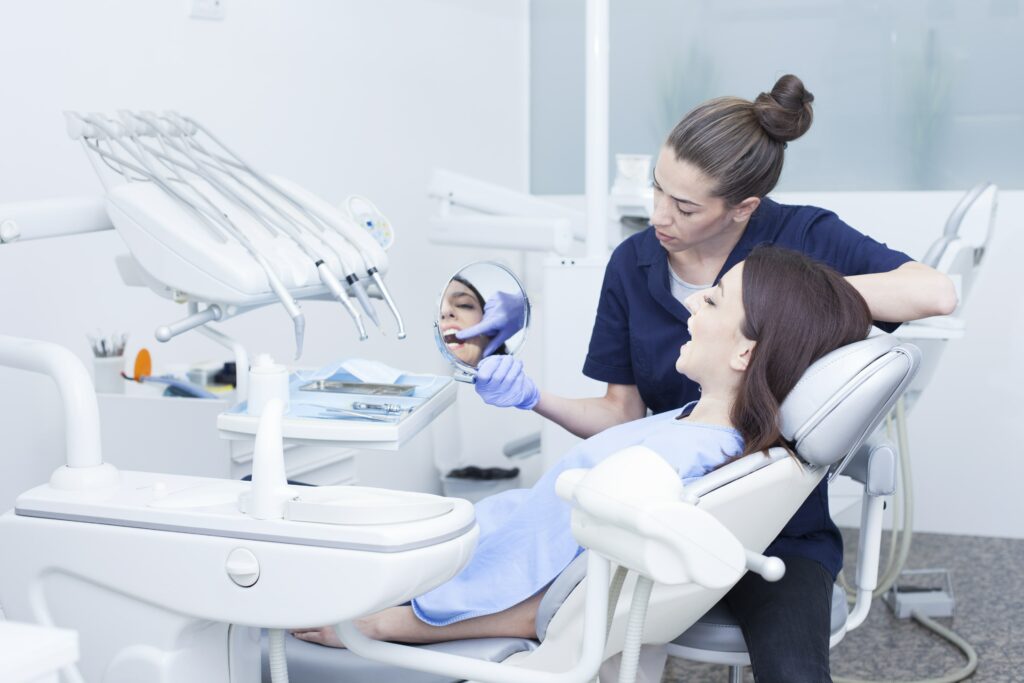The roof of your mouth is known as the “palate”. You have both a hard palate (the roof of mouth closer to the front of your smile) and a soft palate (closer to your tonsils and uvula.) It’s not uncommon for your palate to react to things with issues like redness, itchiness, or even swelling.
What can cause the roof of your mouth to feel itchy? Here are some of the most common causes that you should look out for:
Allergic Reactions
If you feel an itchy sensation in the roof of your mouth, one of the first things you’ll want to consider is if you’re experiencing an allergic reaction. Itchiness inside your mouth, along the lips, or across your palate could be due to exposure to an allergen in your food. Common food allergens include shellfish, tree nuts, milk, eggs, peanuts, wheat, and soybeans. Some people may not have food allergies until they develop them later on in life, so an allergic reaction to what you eat should always be considered if you have an itchy roof of mouth.
Medical Emergencies
Anaphylaxis is a deadly response following a severe allergic reaction. After the initial itchiness in your mouth, the back of the throat and upper airway will seal off, blocking air intake and resulting in anaphylactic shock. If immediate medical attention is not given, anaphylaxis can result in death.
If you already know you have a food allergy or are allergic to bee stings, always keep an epi-pen on you. Once you start to feel an itchy roof of mouth, you need to automatically assume that you’re probably experiencing some type of an allergic reaction that could potentially result in a medical emergency.
Oral Thrush
There is a specific type of oral condition known as “thrush,” which is a type of yeast infection. These oral yeast infections are common among older patients, infants, immunocompromised people, or if you wear removable appliances such as dentures and orthodontic retainers. Thrush develops due to bacterial overgrowth, which can even tie back to antibiotic prescriptions.
Oral thrush typically causes symptoms like burning sensations, tingling or itchiness in the roof of mouth, red and raw skin, and pain. It can make eating extremely difficult.
Taking probiotics, practicing good oral hygiene, and eating yogurt if you’re on antibiotics can help limit your chances of developing oral thrush.
Viral Infections
It’s extremely common to get an itchy mouth, lips, or roof of mouth if there is some type of virus involved. One of the most common viral strains to cause mouth sores or itchiness is the one that causes cold sores (“fever blisters”) which is a strain of herpes (but not that kind; think of it like the virus that causes chickenpox or shingles.)
One of the earliest symptoms of a cold sore popping up is an itchy, tingly feeling. While most of these sores usually develop along the lips, they can form inside of your mouth too.
SIDE NOTE: Given current events, we also now know that mouth sores may be linked to monkeypox.

How to Treat an Itchy Roof of Mouth
There are several at-home treatments for an itchy mouth, depending on the cause behind your symptoms.
1. Improve your oral hygiene routine.
When bacteria are responsible for an itchy palate, you may not be cleaning your mouth well enough. When you brush and floss your teeth, be sure to clean your tongue and roof of your mouth too. Follow up with an essential oil mouth wash, which has antimicrobial properties.
2. Clean your toothbrush and any removable appliances.
If you wear removable oral appliances such as dentures, partial dentures, orthodontic aligners, or a retainer, make sure it’s getting cleaned appropriately every day. Otherwise it will harbor bacteria, which can lead to fungal infections such as thrush (causing an itchy roof of mouth.) Don’t use harsh abrasives or chemicals unless directed by your dentist. Your best option is to use an effervescent cleaner such as denture tablets to soak your appliance routinely, then brush and rinse it well afterward. Your toothbrush can be thrown out, soaked in a 1:1 water/bleach or water/vinegar mixture, or run through the dishwasher.
3. Avoid alcohol-containing mouth rinse products.
Many major mouthwash brands contain alcohol as one of their main ingredients. Alcohol dries out your mouth and can make itchy palate symptoms more irritating.
4. Rinse with warm saltwater.
One of the easiest things to do for soft tissue irritation inside your mouth is to rinse with warm salt water a few times a day. This helps naturally draw out any inflammation or irritation. Simply mix one teaspoon of table salt into 8 ounces of warm water. Swish, gargle, and spit until you’ve worked your way through the entire glass.
5. Manage food or seasonal allergies.
Food allergies are not something to be taken lightly. Even a sensitivity to specific foods may evolve into a severe allergic reaction later on in life. Consider an elimination diet to help narrow down which food you may be allergic to, and carry an epi-pen if you have a known food allergy to peanuts, shellfish, or something similar.
6. Consider other factors.
From virus exposure to anxiety, multiple underlying factors might contribute to an itchy mouth or palate. If you suspect that you’ve been exposed to a virus, are known to get occasional cold sores, or even suffer from anxiety, talk to your doctor or dentist about an appropriate treatment plan. They may want to put you on prescription antifungal medication or antiviral agents based on your risk factors.

When in Doubt, Ask a Dentist
Your dentist is an expert when it comes to oral tissues and infections. While most of us only see dentists for tooth care, they can easily screen for and diagnose a huge array of oral conditions, ranging from thrush and oral cancer to allergic reactions and oral sleep apnea. Be sure to share your concerns with your dental team, as well as when symptoms are most evident, to get to the root of the matter and treat your itchy mouth quickly.





















